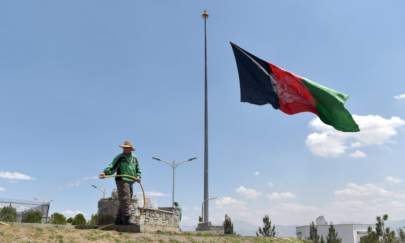Beijing’s Anti-US Remark Backfires as Spokeswoman Blames US for Terrorist Attacks in Afghanistan

A recent bombing in the Afghan capital of Kabul killed 85 people and injured 147. It is suspected that the Taliban was behind the attack. However, instead of condemning the terrorists, China’s Ministry of Foreign Affairs blamed the United States, claiming that the U.S. withdrawal from Afghanistan is causing successive violent attacks in Afghanistan.
On the afternoon of May 8, a bomb exploded near a girls’ school in Dasht-e-Barchi, a major Shiite community in Kabul, and two more bombs exploded when students rushed out in panic. It was the worst among the recent string of deadly bombings in Kabul in months, targeting schoolgirls between 11 and 15 years old.
No group claimed responsibility for the attack. A spokesman for the Taliban terrorist group condemned the school bombings on Twitter, accusing ISIS terrorists of being behind it. According to the Wall Street Journal, Afghan President Ashraf Ghani, however, blamed the Taliban, saying that “by intensifying their illegitimate war and violence, showed that they have no interest in a peaceful solution to the current crisis.”
On the same day as the school bombing, the U.S. Department of State condemned the attack, calling “for an immediate end to violence and the senseless targeting of innocent civilians.”
President Joe Biden announced on April 14 that the U.S. military will begin to withdraw from Afghanistan on May 1 and complete its withdrawal before Sept. 11, to focus on countering the China threat in the Indo-Pacific region.
However, in a Twitter post on May 1, Taliban spokesperson Zabihullah Mujahid wrote, “As withdrawal of foreign forces from Afghanistan by agreed upon May 1st deadline has passed, this violation in principle has opened the way for [Islamic Emirate of Afghanistan] Mujahidin to take every counteraction it deems appropriate against the occupying forces.”
May 1 is the U.S. troop withdrawal deadline that was negotiated under President Donald Trump.
Taliban’s Secret and Open Interactions with Beijing
On June 20, 2019, China’s foreign affairs spokesperson Lu Kang revealed that a Taliban delegation had met with China’s special representative for Afghanistan in Beijing to discuss the group’s peace talks with the United States. It was the first time Chinese authorities openly admitted the Taliban’s visit to China.
According to a report by Tencent.com on July 25, 2019, the Taliban sent a delegation to visit China in 2014; Abbas Stanakzai, Director of the Taliban Political Office in Qatar, visited China in July 2016; and from 2017 to 2018, Chinese Communist Party (CCP) officials met with Taliban members several times.
The report cited Zhang Jinping, a professor of Law and Political Science from the Anti-Terrorism Research Institute of Northwest University, who said, “The Taliban is the main political and armed force in Afghanistan. The long-term turbulence and setbacks in the Afghan peace process indicate that it is difficult to achieve peace in Afghanistan if the Taliban is excluded from the process.”
Lu, the spokesperson who announced the Taliban’s official visit, concluded that the two sides had positive and beneficial exchanges, and they would continue the partnership to find a solution for Afghanistan’s political problems and to crack down on terrorism, according to the Tencent report.
Sheng Xue, a Chinese writer and China expert living in Canada, told NTD that the CCP is actually working closely with international terrorist organizations, as it’s the most important backstage supporter of all authoritarian regimes and terrorist organizations in the world, who provide funds, arms, and technological support.
In July 2011, the CCP violated the United Nations’ ban and provided $200 million worth of supplies and weapons to Libyan dictator Muammar Gaddafi who was at his last extremity via Algeria and South Africa.
Moreover, many terrorists have received military training at China’s training bases. For instance, after the outbreak of the Iraq War, many members of the Iraqi guerrillas who were receiving training in China returned to Iraq to fight with the United States.
The CCP has long been engaged in arms deals with Iran. The CIA confirmed that in August 1996, the CCP and Iran signed an agreement worth $3 billion, including the sale of ballistic missiles, missile guidance technology, and production of military equipment. On March 27 this year, the CCP and Iran signed a 25-year cooperation agreement. The two sides will have comprehensive cooperation in the fields of economy, trade, energy, and security, including military exercises, weapon research and development, and sharing of intelligence.
U.S.-based China expert Li Yanming said the CCP is confusing right from wrong and covering up for the Taliban when it attributed the Kabul bombing to the U.S. withdrawal.
“It once again proved that the CCP is in fact the backstage boss of terrorist organizations and totalitarian regimes such as the Taliban, al-Qaeda, Iran, and Myanmar military government. They join forces and have committed countless crimes together,” he said.
Some Chinese netizens share similar views.
Netizen Wang Xin wrote, “The CCP is a rogue in nature, and a rogue can do anything, even if it’s extremely shameless.”
Another one wrote, “It was the CCP who arranged the Taliban to launch the bombing attacks, to divide U.S. military powers by keeping U.S. troops from withdrawing from Afghanistan. Of course, the CCP will not condemn the Taliban.”
Several other netizens commented that the Taliban and the CCP are good friends, as they both have evil genes.
“The CCP itself is a terrorist organization. How can you expect the CCP to condemn the Taliban?” netizen Dandan wrote.
Source: https://www.theepochtimes.com/beijings-anti-us-remark-backfires-as-spokeswoman-blames-us-for-terrorist-attacks-in-afghanistan_3816484.html****











